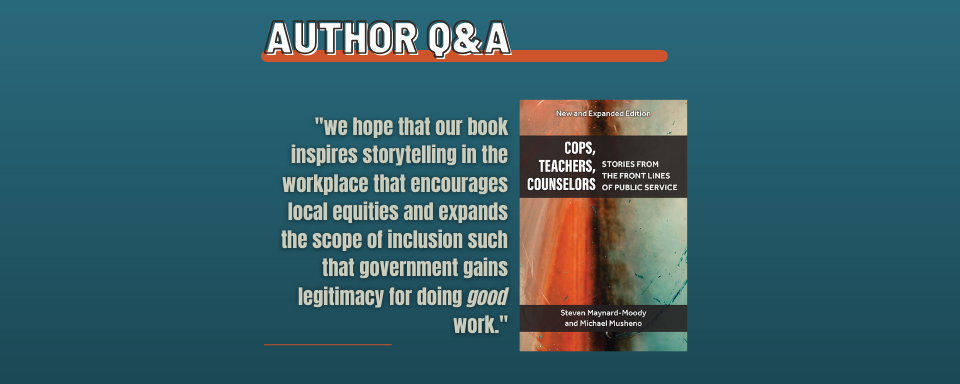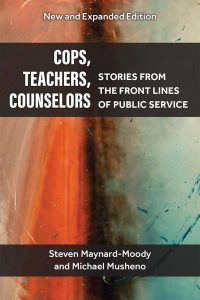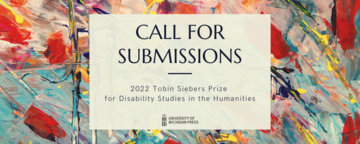Q&A with "Cops, Teachers, Counselors" Authors, Steven Maynard-Moody and Michael Musheno

This guest author post is a Q&A with Steven Maynard-Moody and Michael Musheno, authors of Cops, Teachers, Counselors: Stories from the Front Lines of Public Service , now in a new and expanded edition from the University of Michigan Press. This book is available in hardcover, paperback, and ebook.
Cops, Teachers, Counselors was the first major study to use the stories told by frontline workers such as cops, teachers, and counselors, to analyze how they understand their own street-level work. What does this approach reveal?
Most of us encounter frontline workers in our everyday lives. What is a cop, teacher, or social worker thinking when they interact with us? Based on stories workers told us about fairness and unfairness in the provision of public services, we gained a perspective on how they account for why they do what they do, or what we call their decisional judgments. We found that workers are strongly oriented towards faces , that is they make judgments about the identity, character, and conduct of people. In turn they apply laws, policies, and rules to secure abidance to these moral judgments.
These revelations underpin our claim that frontline workers play a significant role in defining the worthiness of people, which is crucial to their deciding who gets what from government. In this sense, frontline workers shape culture as much, if not more, than they implement public policies. We reference workers’ power to shape public identities as the citizen-agent narrative and to wield legal authority as the state-agent narrative . Putting these two narratives in motion, we claim that morality trumps legality in workers telling of their decisional judgements.
What is different about the new and expanded edition?
This argument remains a crucial part of the new and expanded edition of our book. At the same time, our understanding has evolved as we have continued our field work, expanded our perspective of how law matters, and gained insights from others who study the frontlines of public service across the globe.
Rather than relying almost exclusively on frontline workers’ accounts of their actions, the expanded edition takes up the encounter between workers and the public. The encounter is the place of experience-based learning for both and where judgments are made about the relationship between the state and its people. We identify the players to the encounter as governing workers, whose actions and inactions express the authority of the state, and governed publics, who have capacities or agency but lack the state power of frontline workers. With this adjustment, the social qualities of frontline governance come forward.
Workplace environments and community settings significantly influence encounters and in turn, the accumulation of encounters over time shapes how the governing and the governed judge one another. Norms and practices evolve which choreograph how workers and publics act towards one another in each encounter. For example, cops pay attention to ethno-racial identities and markers of social class, such as neighborhood, in deciding what drivers to pull over for suspicious activities. Black and brown drivers, in turn, come to see any police stops as unjust and dangerous. In such settings, knowledge-based practices become routinized and communicated, for example, with both the governing and the governed recording these stops. Recordings like these may, on occasion, shake the public consciousness and even set in motion reckonings otherwise hidden.
In the expanded edition, we add a third institutional logic, the knowledge-agent narrative to the citizen- and state-agent narratives in the first edition. We take up knowledge-based agency on both sides of the encounter and how it combines with cultural judgments and invocations of law in the everyday to weave together an argument about how frontline governance is continuously implicated in shaping the legitimacy of the state. We give attention to those many moments when the give and take of everyday governance reproduces the social order and those less frequent improvisational moments that open cracks in the social order to produce greater inclusiveness and material wellbeing.
You continue to draw upon stories in the new and expanded edition of Cops, Teachers, Counselors. Why?
That’s right and in fact, we continue to draw upon the same worker stories in the new edition while including more stories we and others have collected from governed publics. We remain focused on how workers account for their actions and are confident that stories are windows for gaining access to their worlds. As we explain in Chapter 3 of the book, personal narratives reveal the storyteller’s point of view while told through a partial reliving of the experience, in our case, workers’ interactions with one another and encounters with publics in the everyday. Stories include vivid depictions of contexts, from offices to the streets, and self-revelations about the identities of the storyteller. At their core, storytelling is normative, that is, to tell a story is to tell a moral. In short, stories poignantly reveal the norms and beliefs that guide choices and actions, the gist of our question about why frontline workers do what they do.
Governed publics are almost always depicted in workers’ stories, but with the identities and character features that workers bestow on them. This, of course, is what workers often do in encounters with members of the public; they categorize people’s worthiness for state action. But gaining access to the voices of the state’s clients reveals their agency or abilities to make judgments and take actions while revealing how they see themselves. Qualities of the governed, including their abilities to counter the power advantages of workers, are part of the story we tell in Chapters 13 and 14 of the new edition.
If you are a teacher, you will quickly discover how the stories in the book provide vivid pathways for critical analysis of frontline work and public activism. They also serve as a heuristic for encouraging grounded argumentation, as with Story 8.2, where a police officer puts his career on the line, shielding an individual whose actions threaten public safety. While obviously powerful teaching tools, we make the argument that public managers would be wise to invite workers’ stories as knowledge-building tools rather than suppress their telling in the workplace. As we have observed in some organizational settings, when supervisors guide discussions and encourage workers to share accounts in group meetings, storytelling can lead to corrections in everyday practices.
How is attention to frontline workers changing, particularly in the volatile times we have been living through?
Like millions of others, we have had our eyes opened wide by living through “The Moment” of sustained public attention to institutionalized racism and the patterned inequities revealed by the COVID-19 pandemic. Our writing coincides with a period of stark contrast when frontline workers gained broad recognition for their essential and positive contribution to society and for their embodiment of the brutal and destructive expression of racialized state power. Most frontline work falls in the spaces between heroic and brutal, between humanizing and dehumanizing behavior. This book examines the in-between more than the extreme while acknowledging the everyday provides a window into the extremes.
The preface to the new edition begins with an excerpt from a story told by Deana, a care provider who works in a neighborhood away from her own and is pulled over by a police officer late at night when going home “for no reason.” Certainly for no good reason. Our book does reveal the reasoning at work and how shorthand hunches workers carry with them related to morality, law, and training combine to produce such practices, like the racialized investigatory police stops, that offend the dignity of people, including essential workers keeping the country going. While paying attention to the irony of being both an essential frontline worker and target of punitive state action, we report on the agency of the governed to resist in part through collective storytelling. We also point to an organizational setting, a high-poverty, diverse public high school where the teachers, themselves diverse, have been at the center of building a local culture of social trust and educational achievement. It is in this milieu of governing and being governed that we stake out our claim about “good” frontline work, where the tendency to produce in/justices at the individual level can be reimagined as localized social practices derived in part from the exchange of stories that expand the scope of inclusiveness and material wellbeing.
What do you hope readers will take away from reading the new edition of Cops, Teachers, Counselors?
We hope readers will see our perspective of why workers do what they do, as well as join us in extending frontline inquiry. To that end, we have identified a series of questions, derived from our thinking to date, but unsettled in our minds as the central focus of the Afterword of the book. If you are on the frontlines of governance, we hope that you see our storytellers and our telling of their stories as a realistic rendering of your experiences. If you are an essential worker, we hope you see that we have opened space for attention to your stories. Finally, we hope that our book inspires storytelling in the workplace that encourages local equities and expands the scope of inclusion such that government gains legitimacy for doing good work.



